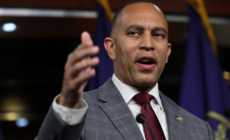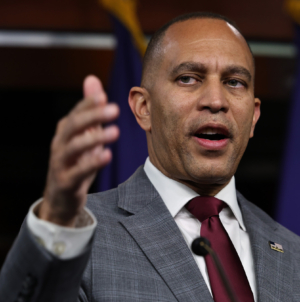-
Democrats Declare ‘Victory’ Over Donald Trump and Elon Musk - 33 mins ago
-
Blake Lively, Justin Baldoni and a Smear Campaign After ‘It Ends With Us’ - 42 mins ago
-
Ukraine Drones Hit Russian Hideout in War’s First Unmanned Ground Attack - about 1 hour ago
-
Michael Brewer, Whose ‘One Toke’ Was a Big Hit, Is Dead at 80 - about 1 hour ago
-
Can ‘Check-in Chicken’ Get You Best Plane Seat for Free? - 2 hours ago
-
Who’s the politician at the center of latest China influence scandal? - 2 hours ago
-
How Canada’s Voters Turned on Justin Trudeau - 2 hours ago
-
Winter Storm Warning for One State Issued as Nine Inches of Snow Forecast - 2 hours ago
-
Plans to transform an iconic San Francisco highway into a park ignite recall furor - 3 hours ago
-
Magdeburg Attack Suspect Said Elon Musk, Alex Jones ‘Telling Truth’: Report - 3 hours ago
Kamala Harris is Achieving Success in Donald Trump’s Strongest Area
Vice President Kamala Harris is becoming more preferred than Donald Trump on matters involving the economy, according to polls.
On Monday, a Harris Poll survey of 2,122 adults, conducted for The Guardian, showed that Americans largely prefer Harris’ economic proposals to Trump’s when presented with each candidate’s policies in a blind test.
An Echelon Insights survey of 1,005 registered voters, released September 25, also suggested Harris was more trusted than Trump to do a better job on the key issues related to the economy and voters’ finances.
The economy is considered the most important issue for voters in any election. Previous polling indicated that Trump was considered the better presidential candidate for the economy, first over President Joe Biden, and then Harris.
Newsweek contacted Trump’s and Harris’ campaign team for comment via email.
Harris has pushed her own economic platform since she became the Democratic presidential candidate. This includes the vice president’s “opportunity economy” strategy to help lower the cost of everyday goods, and extending the child tax credit to $6,000 for families for the first year of their child’s life.
Harris has also moved away from so-called Bidenomics, the president’s economic plans to promote green energy and domestic manufacturing.

Mario Tama/Getty Images
Christopher Borick, a professor of political science and the director of polling organization at the Muhlenberg College Institute of Public Opinion in Pennsylvania, said that Harris has been able to “modestly cut” into Trump’s advantage on economic matters due to her increased attention to the issue.
“She still has an uphill route given the public’s generally negative appraisal of economic conditions and her connections to the current administration, but her focus on policy positions that are generally popular and distinct from Bidenomics has helped her carve out a more competitive pitch on what is by far the most salient issue in the race,” Borick told Newsweek.
He added: “It’s still a challenge for Harris to overcome the public’s overall negativity on economic matters, but engaging in this realm with fairly popular policy positions gives her an opportunity to compete more effectively in this key area.”
The U.S. economy was largely strong under the Trump administration. In comparison, the Biden-Harris administration has seen the country be hit with decades-high levels of inflation as well as record-breaking gas prices.
Gas prices have since fallen, and inflation dropped to a three-year low of 2.5 percent in August. The U.S. unemployment rate is also lower than the long-term average.
The Harris Poll/The Guardian survey gave respondents a list of 12 economic proposals—six from Harris and six from Trump—and asked them to select which ones they agreed with. Those taking part in the survey were not told whose campaign each policy belonged to.
The results showed that four of the five most popular economic policies were Harris’.
The most popular was Harris’ proposed federal ban on price gouging of food items (44 percent).
Other Harris policies which made up the top five were expanding the child tax credit (33 percent), selected tax breaks for new small businesses (33 percent) and increasing the tax rate on long-term capital gains for those earning more than $1 million (29 percent).
Trump’s proposal to cut taxes on social security benefits was the second most popular in the blind test (42 percent).
The survey was conducted between September 12-14. The results had a margin of error of plus or minus 2.6 percentage points.
The Echelon Insights survey showed that 26 percent of voters said the cost of living was the biggest issue facing the country, followed by jobs and the economy at 14 percent.
Voters in that survey said they trusted Harris more than Trump to handle the cost of living by 48 percent to 45 percent. Harris was also ahead 47 percent to Trump’s 45 percent on who would better handle jobs and the economy. The results had a margin of error of plus or minus 3.7 percentage points.
There are still polls which have Trump ahead of Harris in terms of the economy.
A recent NPR/PBS News/Marist National poll of 1,413 registered voters showed 52 percent said Trump would better handle the economy than Harris (48 percent). The survey was conducted between September 3-5, and had a margin or error of 3.3 percentage points.
A Reuters/Ipsos poll of 1,029 U.S. adults, conducted September 11-12, asked which candidate had the better approach on the “economy, unemployment and jobs.” Trump got the backing of 43 percent, while 41 percent said Harris. The results had a margin of error of around 4 percentage points.
Source link




















